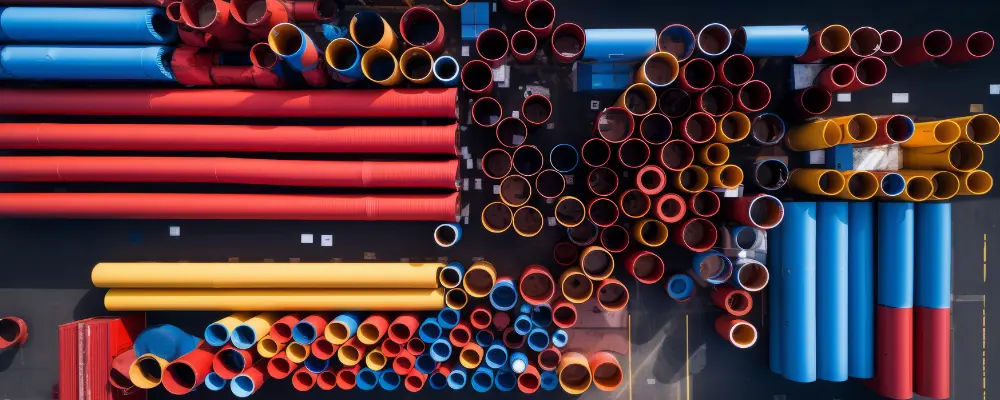Plumbing is an essential aspect of ensuring the smooth flow of water and waste in a structure. Apart from functionality, plumbing influences the overall structural integrity of a building. Beyond connecting the utilities, the pipes you use in your construction projects play a crucial role in preventing blockages and even structural damage arising from improper installation and material choices.
Today’s construction industry uses different types of pipes, and each of them has specific uses. Some pipes are ideal for plumbing, while others are ideal for structural applications. When it comes to using them for installation, you must consider their purposes because the main piping material influences your other pipes. Furthermore, the advantages provided by each type of pipe include cost-efficiency, versatility, and environmental friendliness.
The blog discusses in detail the different types of pipes used in building construction, examining their benefits and common uses. It helps industry experts make informed decisions when choosing the right pipe for a particular project. Once you understand these options, it helps ensure the long-term efficiency and safety of any building.
Importance of Plumbing in the Construction Industry
A plumbing system refers to the arrangement of pipes, drains, fittings, and furnishings that allow the distribution of smooth water and the elimination of wastewater. Whether you are constructing a multi-storey apartment, a bungalow, a villa, a small house, or a commercial building, plumbing stands as its lifeline, ensuring residents have access to clean and safe water for consumption.
Without an adequate plumbing system, no one would be able to live in a structure. In the absence of proper plumbing, inhabitants cannot perform daily routines such as taking showers, flushing toilets, washing clothes, or accessing food and clean drinking water. Efficient plumbing enables these daily activities to function effectively, underscoring their significance.
Does your structure have an efficient plumbing system? Whether your building serves residential or commercial purposes, with an efficient plumbing system, the occupants can enjoy the following:
Clean Water Supply: A plumbing system must provide continuous and easy water supply to all the inhabitants. In the absence of soft water for drinking, cooking, and cleaning, the people living in the house or an apartment might be exposed to various health risks.
Efficient Wastewater Disposal: Plumbing systems are responsible for removing wastewater from homes. If your structure has an appropriate plumbing system, it ensures proper drainage and sewage systems, safeguarding public health.
Enhance Comfort and Convenience: Today’s modern plumbing systems offer the level of comfort and luxury that earlier generations could only imagine. From hot water showers to dishwashers and washing machines, these plumbing systems enhance our quality of life and existence.
Types of Pipes Used in Building Construction
Every building structure requires a sufficient amount of water, which must be available at the service locations according to the requirements of the occupants. You must calculate the supply demands and the amount of water transmitted through the pipes in the building. Moreover, you must also calculate the requirements for drainage and waste management. Different types of pipes have different uses. For instance, the pipes used for supply are different from those used for drainage.
Supply Pipes or Service Pipes
The pipes connecting the main water supply and the plumbing system of the house are the service pipes. These pipes comprises of the following materials:
- Copper pipes
- Galvanised iron pipes
- PVC pipes
- CPVC pipes
- PEX pipes
Copper Pipes
In some areas, you might find the underground water to be highly corrosive to metals. In these areas, installing copper pipes is the best choice. Copper has high corrosive resistance when compared to other metal pipes. Besides, these pipes have considerable strength and reasonable ductility, making them available in long lengths on the market. Since these pipes can bear high pressure, they are ideal for industrial purposes with heavy flow. Whether you require a heavy gauge or a light gauge variety, you can easily avail of these on the market. Heavy-gauge pipes are ideal for use in areas where pressure is very high, such as the leading pipe from the main distribution. The light gauge pipes, on the other hand, are ideal for usage in areas where the pressure is minimal, such as internal domestic pipes.
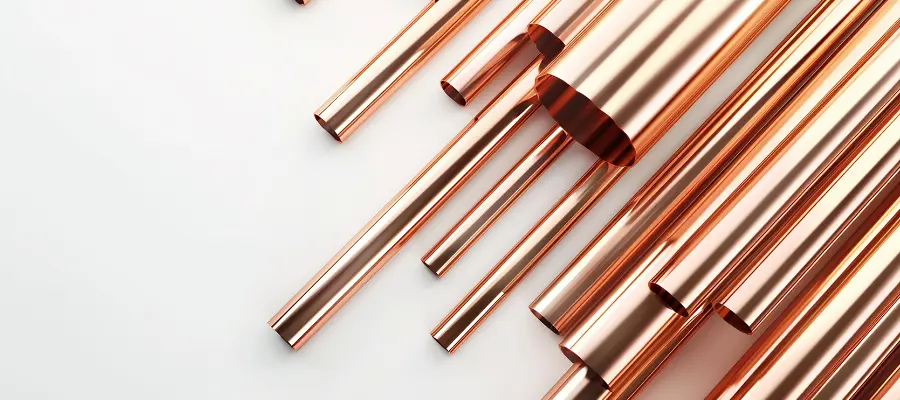
Galvanized Iron Pipes
If you cannot afford copper pipes and are looking for an economical option, the galvanised iron or steel pipes are the best choice. However, they corrode easily when they encounter soft and acidic waters. In other cases, these pipes are stronger than copper pipes, making them an ideal choice for usage in areas where corrosion is less or in hard water areas. Do not forget to hammer the pipes to remove the hard scales formed when exposed to hard water.
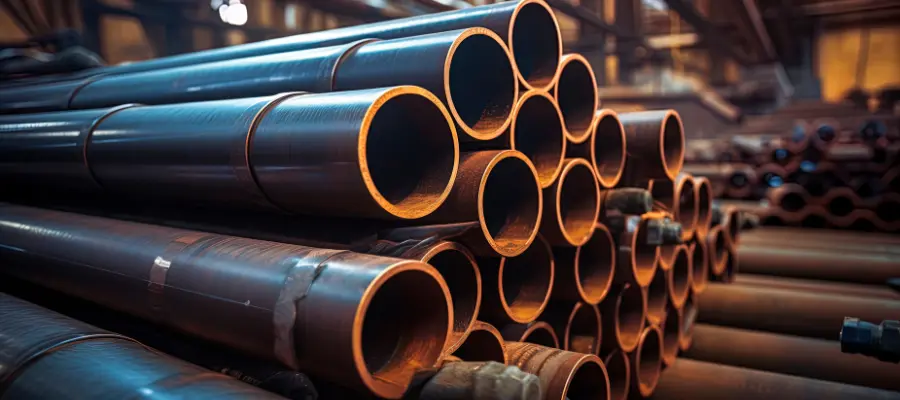
PVC Pipes
PVC pipes are ideal for cold water service networks. They are lightweight, corrosion-resistant, and easy to install, leading to increased demand in modern plumbing systems. Unlike other types, PVC pipes do not require threading applications and are cost-effective compared to galvanised iron pipes. However, they should not be used for hot water applications, as they can only withstand temperatures up to approximately 140 degrees Fahrenheit (60 degrees Celsius).
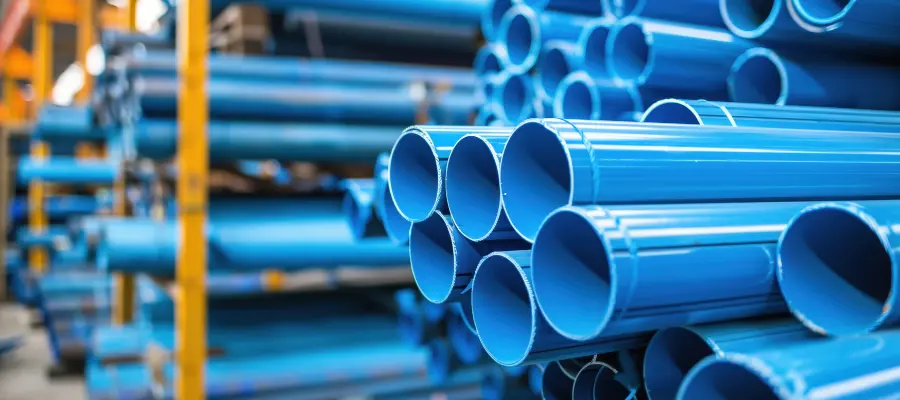
CPVC Pipes
Although CPVC pipes and PVC pipes look similar from the outside, they have different chemical or molecular structures. During the manufacturing of CPVC pipes, the manufacturers add chlorine to them. Like PVC, CPVC pipes are strong, rigid, and available in similar sizes. However, CPVC can handle higher operating temperatures of around 200 degrees Fahrenheit (93.33 degrees Celsius), making it suitable for hot water lines such as those used in solar systems or geysers.
PEX Pipes
PEX, or cross-linked polyethylene pipes, are designed to handle both hot and cold liquids, making them ideal for various commercial establishments. Their flexibility makes them perfect for hard-to-reach areas within and under buildings. PEX pipes are easy to install and replace, even in spaces with numerous obstacles. Known for low maintenance and durability, they are among the most sought-after options for plumbing in commercial settings.
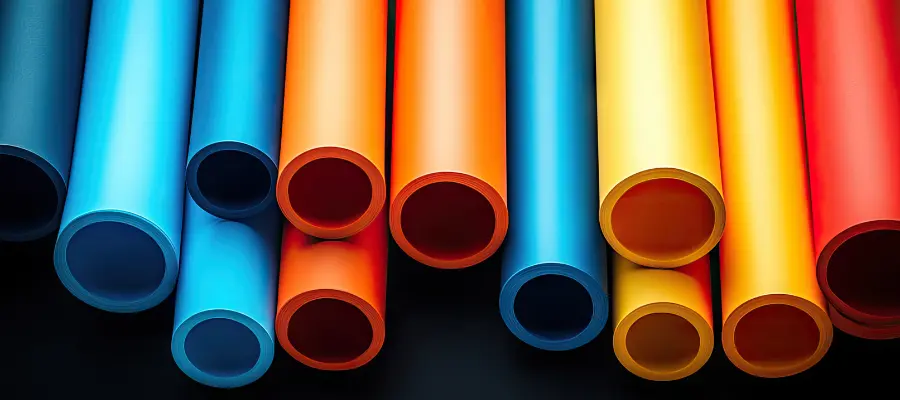
Drain Pipes or Disposal Management Pipes
Residential accommodations produce wastewater from various sources, like kitchens, bathrooms, and toilets. The disposal of wastewater requires an interconnected network of pipes. You need to use different types of disposal pipes for varied functions like soil waste management, wastewater, rainwater, and ventilation. Waste disposal pipes come in different materials and differ in properties. Pipes used in the drainage system include the following:
- Cast iron pipes
- Concrete pipes
- Asbestos pipes
- Stoneware pipes
- HDPE pipes
Cast Iron Pipes
Cast iron pipes are commonly used in sewer lines by domestic and commercial occupants. Since it is stronger than most other pipes, it can withhold the weight of dirt and slugs without breaking. These pipes are prone to rust and corrosion in real-time. Since they wear out due to corrosion, one can observe a certain decrease in diameter. They are primarily suitable for indoor plumbing networks.
Concrete Pipes
When constructing a building, it is essential to connect the structure’s major water supply with the main water supply line. Concrete pipes are available in both large and small diameters; larger pipes are ideal for heavy drainage, while smaller ones are suitable for lighter flows. Completely made of concrete, these pipes do not require reinforcement.
Asbestos Pipes
It’s one of the cheapest plumbing pipes. The asbestos pipes are better than the PVC pipes, especially if you are looking for good quality at an affordable price. These pipes are ideal for the drainage of water, sewage, and rainwater from roofs. You can also use these pipes for ventilation. The best thing about these pipes is that they can withstand high pressure, and the installation does not require skilled labour.
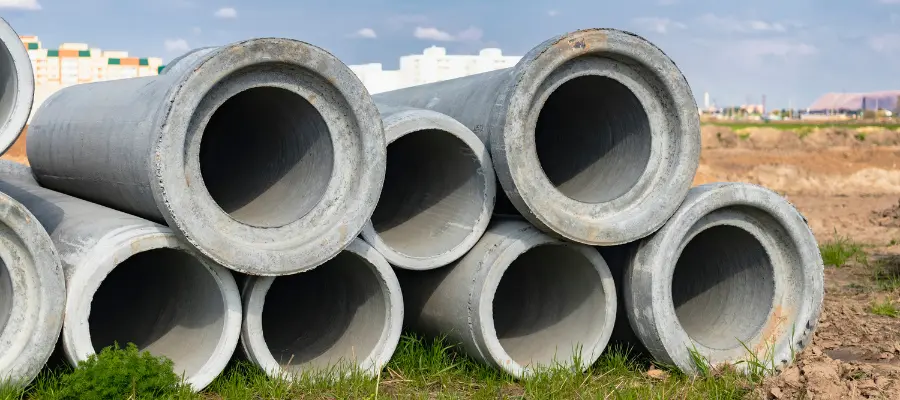
Stoneware Pipes
Manufacturers manufacture stoneware pipes in the ceramic industry by burning soft soil at high temperatures. They are ideal for underground drainage systems in low-cost construction buildings. Although affordable, the installation and supervision processes require skilled workers.
HDPE Pipes
The high-density polyethylene pipes are in high demand. They can be procured in various thicknesses and can be bent up to 90 degrees. Since they are resistant to biological sustenance, they are ideal for pressurised wastewater lines and sewage disposal networks.
Things You Must Consider While Choosing a Plumbing Pipe
Whether you are a homeowner, a newbie plumber, or a construction engineer, you must consider the following when choosing the plumbing pipes in your building construction:
Purpose of Usage
Do not forget to determine the purpose of the pipes you are using in your construction project. While some pipes supply water, others are ideal for disposal of sewage or waste. Since the pipes are made of different materials, sizes, and thicknesses, they serve different purposes.
Water Pressure Resistance
If you are constructing a commercial building, you need pipes that can withstand high water pressure. Opt for pipes with durable, wide mouths and smooth interiors for optimal water flow and longevity. Plastic, copper and brass pipes are some of the best pipes when it comes to water resistance, as these pipes possess all the features and are rust-resistant.
Water Type and Corrosion Level
Although it is one of the most important things to consider, most people hardly focus on it when it comes to choosing a plumbing pipe. The kind of water you use in plumbing determines the longevity of the pipe. If water is corrosive, it will dissolve almost all materials, degrading your pipe within a short span of installation.
The Degree of Exposure to Sunlight
The ultraviolet rays are harmful to your pipes as well. Therefore, you must select pipes with insulation properties, as they can withstand high temperatures for longer. If you know that your pipes have a chance of getting exposed to sunlight, avoid using plastic and PVC pipes since they cannot withstand hot temperatures. When installing pipes, ensure that they are done in a way that they won’t be vulnerable to direct sunlight, which might damage their surface quality and weaken them in the future.
The various types of pipes used in building construction have varied usage and hence comprise different materials, including plastic, PVC, asbestos, concrete, copper, galvanised iron, and others. Most of the applications depend on a particular pipe’s capability to transmit fluids without any changes to the pipe. Therefore, some pipes are more suitable for particular purposes, such as the distribution of water from the main water supply system, while others have a broader and more general structural use.
Brick & Bolt emerged as a leading construction company, providing their customers with complete design-to-build service with advanced facilities like real-time tracking, effective communication, quality checks, and updates on projects from the undertaking of the project to the final delivery. The organisation focuses on bringing transparency and trust to the industry. You receive regular updates about the quality and progress of your projects, which they map using advanced technologies. Whether you are building your dream home or upgrading the plumbing system of your home, Brick & Bolt’s expertise will take care of all your minute demands within your budget.

